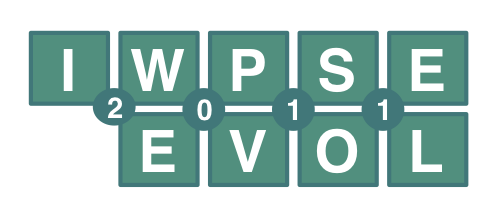
12th International Workshop on Principles on Software Evolution
7th ERCIM Workshop on Software Evolution

IWPSE-EVOL’2011 invites high-quality papers presenting experiments, surveys, approaches, techniques and tools related to the evolution of software systems. A special issue of the best papers will be published in the Journal of Software Maintenance and Evolution: Research and Practice.
Topics of interest include, but are not limited to:
-
Application areas: distributed, embedded, real-time, ultra large scale, and self-adaptive systems, web services, mobile computing, information systems, systems of systems, etc.
-
Paradigms: support and barriers to evolution in aspect-oriented, agile, component-based, and model-driven software development, service-oriented architectures,etc.
-
Technical aspects: co-evolution and inconsistency management, impact analysis and change propagation, dynamic reconfiguration and updating; architectures, tools, languages and notations for supporting evolution, etc.
-
Managerial aspects: effort and cost estimation, risk analysis, software quality, productivity, process support, training, awareness, etc.
-
Empirical studies related to software evolution.
-
Mining software repositories approaches and techniques supporting software evolution.
-
Industrial experience on successes and failures related to software evolution.
-
Interdisciplinary approaches: adaptation of evolutionary concepts and measures from other disciplines (biology, geology, etc.) to software evolution.
-
Theories and models to explain and understand software evolution.
Submission types
Four types of submissions are possible: short
position and tool papers (up to 5 pages) and long research and
industrial papers (up to 10 pages).
Position papers may present wild and speculative ideas, and will be judged on the potential to generate interesting discussions at the workshop. Tool papers may describe tools developed in academia or industry. The workshop will include one or more sessions for tool demos.
Research papers should describe innovative research, while industrial papers may describe the application or adaptation of known solutions to industrial case studies, and reflect on lessons learnt.

